
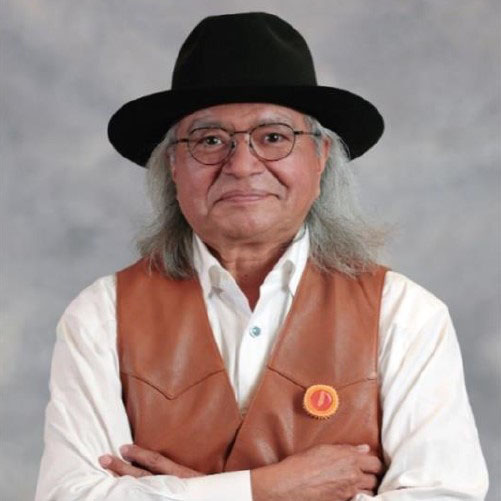
C.T.(Manny) Jules, Chief Commissioner, First Nations Tax Commission
C.T. (Manny) Jules has dedicated over 40 years of his life to public service in support of Aboriginal issues. He is a member of the Tk’emlúps te Secwépemc, formerly known as Kamloops Indian Band, and served as Chief from 1984 to 2000. Mr. Jules led the amendment to the Indian Act in 1988 so that First Nations could exercise the jurisdiction to levy property taxes on-reserve. The Indian Taxation Advisory Board (ITAB) and the current First Nation property tax system were created as a result of his vision and efforts. Mr. Jules served as Chair of ITAB from 1989 to 2003 and 2005 to 2007. He was the driving force behind the First Nations Fiscal Management Act, passed by Parliament in 2005, creating the First Nations Tax Commission, the First Nations Financial Management Board, and the First Nations Finance Authority. On November 11, 2006, Mr. Jules was appointed Chief Commissioner of the First Nations Tax Commission. Mr. Jules was the recipient of an Honorary Doctorate of Laws from both the University of British Columbia in 1997 and Thompson Rivers University in 2006, the Order of British Columbia in 2009, and the Queen’s Diamond Jubilee medal in 2013. Mr. Jules was also awarded the Aboriginal Lifetime Achievement Award by the Canadian Council for Aboriginal Business in 2013.
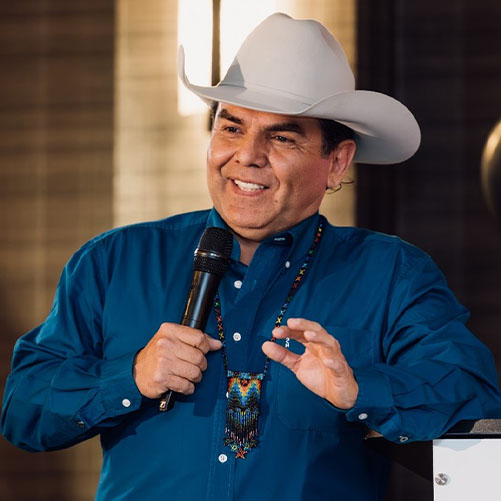
Grand Chief Michael LeBourdais - Whispering Pines/Clinton Indian Band
Grand Chief Michael LeBourdais is of Secwepémc, St’át’imc and Okanagan Heritage. He is the proud father of three, and son of Duke LeBourdais of Clinton and Charlotte LeBourdais formerly of Xaxlip. His maternal roots can be traced back to Chief Comox.
Along with serving as the Chief of the Whispering Pines/Clinton Indian Band for many years—a small but vibrant community – he is also the Chair of the Tulo Centre of Indigenous Economics since its inception in 2008.
Grand Chief LeBourdais has also served on the Board of Directors of the Cayoose Creek Development Corporation, All Nations Trust Company, Shuswap Nation Tribal Council, Native Economic Development Advisory Board, Secwepemc Child and Family Services Society, Secwepemc Cultural Education Society, Shuswap Training and Employment Program, Commanding Officers Aboriginal Advisory Committee, and the Community Tripartite Agreement.
Grand Chief Michael LeBourdais grew up familiar with the challenges many of today’s youth face when creating economic opportunity on First Nations land.
As a child, his parents were turned down for a credit card due to a lack of collateral—despite owning a ranch and two houses. Because of the Indian Act, his parents didn’t own the land in the eyes of the credit card company.
The barriers in place by The Indian Act prevent First Nations from participating in the economy. These obstacles are the driving force for Grand Chief Michael LeBourdais to be the Chair of the Tulo Centre. He wants to help communities and First Nations actively participate in the economy by developing their knowledge and skills. Indigenous economics are a vital ingredient to helping communities grow and prosper.

Chief Derek Epp - Tzeachten First Nation
Ey Swayel, Chief Derek Epp is a proud descendant of the Wealick family and is honoured to walk with the Xwelmexw name Weli’leq while serving his community as Chief. Derek has been fortunate enough to live on Tzeachten First Nation since he was two years old which has given him the ability to understand the importance of the sense of community and family while balancing the need for progressive governance to move our communities forward through self-determination.
During his educational journey he was able to achieve his Diploma in Social Services while specializing in First Nations studies. Derek used that diploma to further his education and complete a Bachelor’s in Social Work. During his first term as Chief, he decided to expand his knowledge and completed the Aboriginal Management Program at the University of British Columbia along with the Certified Aboriginal Professional Administrators designation through the AFOA to enhance his business and management skills with a goal of completing a master’s in business administration.
While serving as Chief, Derek has been involved in economic development as well as asserting our rights and title by sitting on various Boards within Chilliwack, the province and nationally which includes, Vice President of Ts’elxwéyeqw Tribe’ Management Limited; Chair of Shxw Kwimel Cha Management Ltd – Tzeachten First Nations Economic Development Board of Directors Deputy Chair of the First Nations Finance Authority; Board and Executive member of the Chilliwack Chamber of Commerce; Vice President of the Chilliwack Youth Health Centre. Derek is an advocate for all forms of economic reconciliation, with local municipalities, provinces, and federal government. Working together to progress as communities is the only path towards true reconciliation, economic reconciliation.
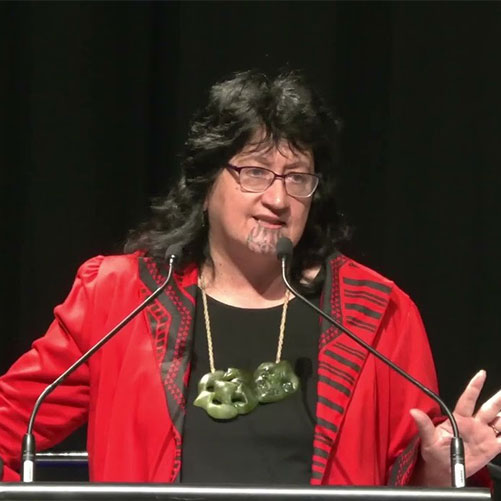
Annette Sykes - Director, Annette Sykes & Co Ltd
Annette Te Imaima Sykes is of Ngāti Pikiao and Ngāti Mākino descent who focuses on Māori law in her own law firm. She has been actively advocating for human rights for over 35 years and is dedicated to bringing about constitutional change. She has also been involved in the Waitangi Tribunal Claims process, which addresses issues related to the cultural and intellectual property rights of Māori communities affected by government policies. She is an adjunct professor at the Faculty of Law at Auckland University as part of a commitment to ensuring the reclaiming of Māori law, Tikanga Māori as the first law of this nation.
Annette was one of the first members of the Māori Broadcasting Agency in 1993, which was established after successful court claims regarding the Māori language. She also served as a founding member of Aotearoa Fisheries Ltd and was appointed Deputy Chairperson as part of the Māori Fisheries Settlement in 1989.
Annette has represented Māori in various United Nations forums and has provided advice on issues such as human trafficking, promoting a nuclear-free Pacific, and advocating for Indigenous rights. She has held important positions in several organisations dedicated to sustainable Māori development.
Currently, she is a member of Te Tai Kaha Māori Collective and acts as an advisor to the Government in promoting Māori rights, interests and responsibilities in freshwater and taking part in the Resource Management reforms. She recently became the main lawyer representing Māori in claims against the government regarding the CPTPPA, ensuring that Te Tiriti o Waitangi is respected in free trade negotiations. Above all, she is a mother and grandmother and is deeply connected to her tribal communities who have supported her throughout her career.
Since 2022, Annette has held the position of trustee on the Crown Forest Rental Trust, succeeding Tā Taihakurei Durie. More recently, in December 2023, she was nominated to serve as a trustee on the Rotoiti 15 Trust. She manages her own firm of five lawyers, and she has mentored a number of young members of the profession into pathways in academia and litigation roles.
In recognition of her significant contributions to the legal field, Annette has recently been honoured with two prestigious awards. In August 2024, she was conferred the Access to Justice Award by the New Zealand and Australian Bar Association. This was followed in September 2024 by the bestowal of the Lifetime Membership Award from Te Hunga Rōia Māori, the Māori Law Society.

Dr Eric Crampton
Eric is Chief Economist with the New Zealand Initiative and Adjunct Senior Fellow with the Department of Economics and Finance at the University of Canterbury, where he previously served as Senior Lecturer. He covers a broad range of economic policy areas including regulation, housing, competition, tax, and environmental management. His commentary on economic policy issues appears regularly in most major media outlets, where he has also written frequently on powers exercised by Canadian First Nations over their own land. His most recent research note, Local Cures, described devolution of health service delivery to First Nations communities in British Columbia.
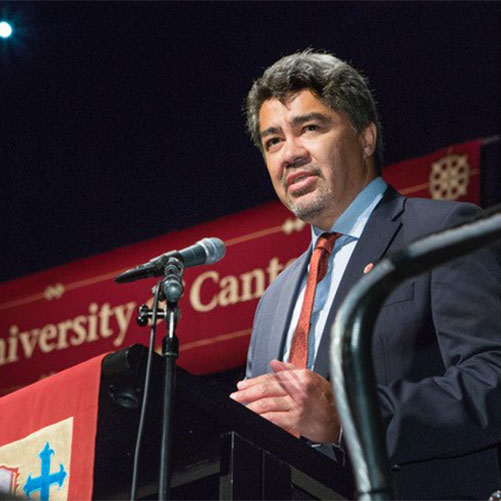
Upoko Professor Te Maire Tau
Te Maire is the Pou Whakarae of the Ngāi Tahu Centre, Office of Treaty Partnership at the University of Canterbury. He took up the Director position of the Ngāi Tahu Research Centre in 2011, having previously been a Senior Lecturer in History at the University.
Te Maire belongs to Ngāi Tahu, the principal tribe of the South Island, and lives in Tuahiwi, the largest village of that tribe. Te Maire is the Upoko (Director) of Ngāi Tūāhuriri (the tribal group of the Tuahiwi region in Canterbury) and Co-Chair, Te Kura Taka Pini (Ngāi Tahu Freshwater Management Group).
During his years as an undergraduate and later as a postgraduate student at Canterbury, Te Maire helped iwi leaders with their land claim to the Waitangi Tribunal, with a particular emphasis on traditional food-gathering practices. As a specialist historian on oral traditions, tribal genealogies and indigenous knowledge systems, Te Maire was used as an expert witness and historian for the settlement of the Ngāi Tahu Claim - the largest settlement in its day between Māori and the Crown for lands wrongfully taken.
Since then, he has had several publications dealing with oral traditions and the relationship between indigenous knowledge systems and how they intersect with western science. Te Maire’s research interests include the philosophy of knowledge, oral traditions, myth, indigenous development / tribal economies and history.
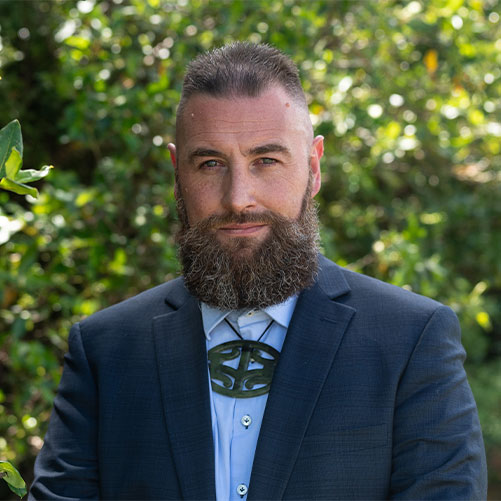
Justin Tipa - Kaiwhakahaere Te Rūnanga o Ngāi Tahu
Justin Tipa (Ngāi Tahu, Ngāti Mamoe) is the elected Kaiwhakahaere (Chairperson) of Te Rūnanga o Ngāi Tahu. He joined the Te Rūnanga o Ngāi Tahu Board in 2021 when he was appointed Representative for Te Rūnanga o Moeraki.
He has been the chair of Te Rūnanga o Moeraki since 2019 and is an executive member of Kāi Tahu ki Tuawhenua, which represents the seven Papatipu Rūnanga of the Queenstown Lakes area.
Justin has a background in language revitalization and education and is widely respected for his knowledge of, and commitment to, Ngāi Tahu tikanga.
Prior to being elected Kaiwhakahaere of Te Rūnanga, Justin spent 7 years working for Fonterra where he played a key strategic leadership role in growing their engagement with the Māori economy.
Justin’s blend of cultural, governance, and corporate experience makes him uniquely suited to lead Ngāi Tahu as the Chairman of its tribal council.